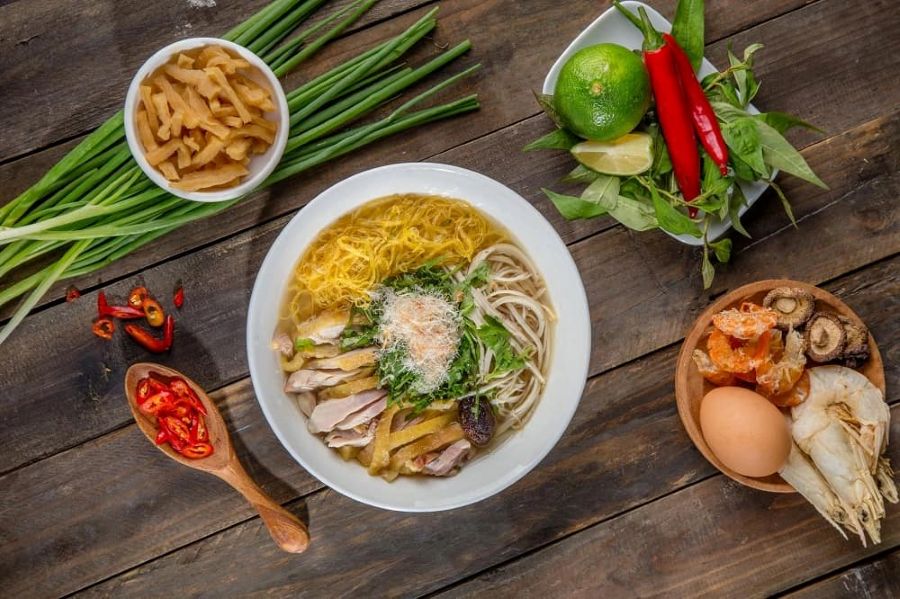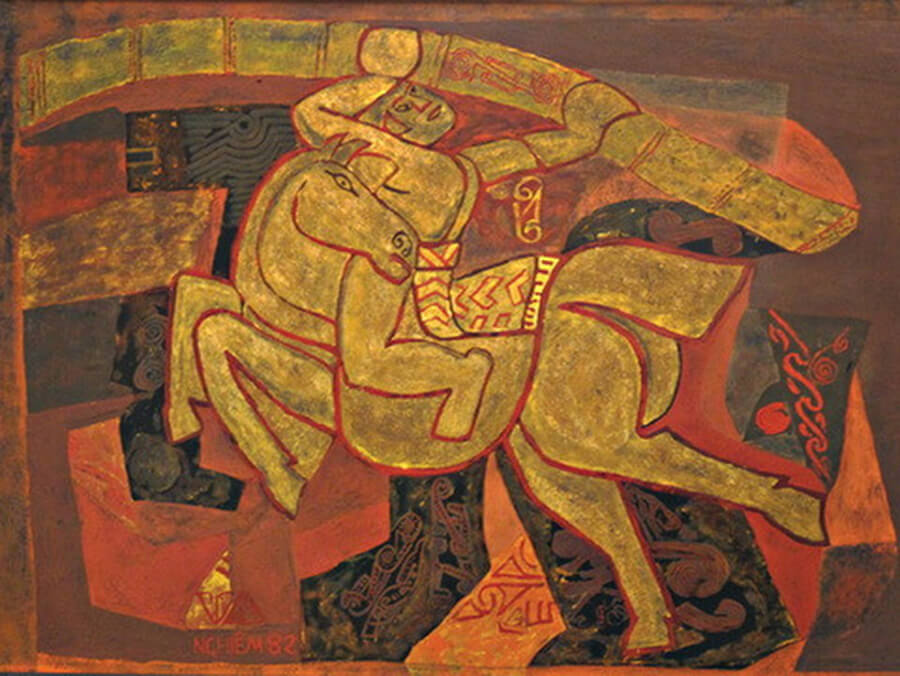The exact origin of “bun thang”, a Hanoi specialty that has been a hit with many foreign diners, including millionaires, is uncertain.
Nvidia CEO Jensen Huang was treated to a number of Vietnamese dishes during a trip to Vietnam late last year, including Mrs. Am’s bun thang, or mixed-ingredient vermicelli soup. After indulging in two bowls of bun thang and two cups of iced black coffee, the billionaire admitted it was the best breakfast he had ever had.
Hanoi’s signature summit dish
It was a spring day a few years ago, on February 27, 2019, the famous Vuon Am Thuc or Culinary Garden Restaurant on Cua Nam Street was briefly closed as owner and chef Doan Van Lai was hard at work preparing her signature dish – Mrs. Am’s Bun Thang – at the Hanoi Food Court in the Friendship Labor Cultural Palace. At that time it was the site of the international media center during the summit between North Korea and the United States in Hanoi.
“Even though my counter was four times larger than the others and I had fifteen employees working around the clock, I could hardly service all the customers. Some reporters came here for eight meals in four days, and each time they praised the food,” Lai said.
To cater to the 3,500 international and local reporters, traditional food counters were set up with Hanoi specialties such as Pho Thin, Mrs. Lan’s banh khuc, bun cha, Giang Cafe’s egg coffee, West Lake lotus tea, and Mrs. Am’s Bun Thang.
A crowd of diners waited patiently at Lai’s counter to watch the chef’s demonstration. After serving about 3,000 bowls of the noodles in two days, he said his counter had earned the fame of “top-class bun thang” and was featured on international news channels.
 |
| Nvidia CEO Jensen Huang tries Mrs. Am’s Bun Thang during his trip to Vietnam in 2023. Photo: Doan Nhat Anh |
Four years later, under heightened security, a strange group of foreign guests arrived at the Vuon Am Thuc restaurant in four luxury cars. The owner was astonished to learn that the guest was the CEO of Nvidia, a $3.44 trillion technology behemoth, and the tenth richest person in the world, Taiwanese-American millionaire Jensen Huang. He had only ever seen the VIP on TV or in the newspaper. Jensen Huang was on a business trip to Vietnam to promote the country’s semiconductor industry.
“After having two bowls of bun thang and two cups of black iced coffee from the restaurant, he admitted that he had never had such a delicious breakfast in all his years of traveling around the world. I’ll always remember that statement,” said the third-generation Mrs. Am’s Bun Thang chef.
Special Vietnamese patrols
According to Lai, his grandmother, Le Thi Tho (alias Le Thi Hai), opened a bun thang stall on Cho Gao Street in 1888. It was one of the first food stalls in the old Dong Xuan market. Later, her daughter and Lai’s mother, Dam Thi Am, continued the business.
“Tran Duy Hung, Chairman of the Hanoi Administrative Committee (Mayor), was fond of our bun thang. Like other customers, he always waited his turn in line. He was slim and thin and usually wore white glasses and a uniform. Every time he came, he would call out to order, ‘The usual, Mrs. Am,'” Lai nostalgically recalled.
At that time, their stall was just a bamboo table with a few wooden benches. But every morning until noon, it was packed with customers. “You’re not from the capital if you haven’t eaten Mrs. Am’s bun thang,” many joked.
The late writer Bang Son, the famous Hanoi cuisine writer, could not miss the restaurant in his guide to Hanoi food: “There were couples who came here to eat bun thang when they were young. Even after their hair turned gray and they had children and grandchildren, they continued their habit of going to Dong Xuan Market together to find Mrs. Am’s bun thang.”
Since Lai moved the restaurant to Cua Nam Street, the restaurant has been serving a new customer base: overseas Vietnamese diners. “There was an old man in his 80s who had lived abroad for 30 years. After returning home, he went straight to Dong Xuan Market to look for Mrs. Am. Told by some merchants, he walked from Dong Xuan to Cua Nam to order a special bowl of bun thang. After eating, the satisfied customer said he had found the taste of bun thang he had missed for many years away from home,” Lai said.
A gorgeous Hanoi specialty
As the name suggests, bun thang is made from bun, or rice noodles, and thang, a Sino-Vietnamese word meaning either “soup” or “mixture” of Oriental medicinal herbs. The soul of the dish is the simmered pork and chicken bone broth. In addition, bun thang combines up to 12 ingredients, including boneless chicken, dried shrimp, pork bologna, fried egg, shiitake mushrooms, fresh herbs, and more.
Bun thang‘s broth is clear and subtly sweet without being fishy, thanks to its unique formula. Along with a small shrimp paste, giant water bugs, pickled radish, shallots, cilantro, and Vietnamese coriander – the latter four chopped – the bowl of noodles is exquisitely arranged like a flower when presented to guests.
The dish is often garnished with lime and chili for a harmonious balance of flavors. It’s a favorite among locals and visitors to Hanoi, often eaten as a comforting meal.
However, this Hanoi specialty is more difficult to find than other dishes such as banh cuon and pho bo. It is almost unavailable in other provinces outside of Vietnam’s capital.








